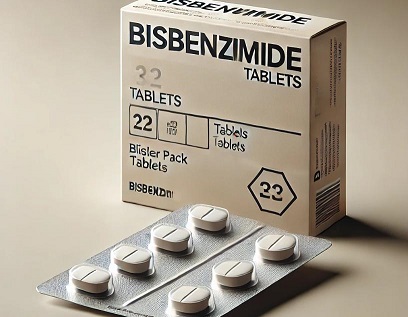Bisbenzimide compounds show promise in combating poxvirus infections including Monkeypox (Mpox)
Nikhil Prasad Fact checked by:Thailand Medical News Team Aug 17, 2024 8 months, 1 week, 3 days, 12 hours, 16 minutes ago
Mpox News: Breakthrough in Poxvirus Treatment-New Hope Against Pandemic Threats
Recent research conducted by scientists from the University of Birmingham-UK, the MRC-University of Glasgow Centre for Virus Research-Uk, and other prestigious institutions has unveiled promising results in the fight against poxvirus infections, particularly those with pandemic potential. This
Mpox News report explores the findings of the study, which investigated the antiviral properties of novel bisbenzimide compounds, offering hope for new treatments in the ongoing battle against these dangerous viruses.
 Bisbenzimide compounds show promise in combating poxvirus infections
Bisbenzimide compounds show promise in combating poxvirus infections
including Monkeypox (Mpox) Image-AI Generated
Understanding Poxvirus and the Need for New Treatments
Poxviruses, a group of DNA viruses that include the notorious smallpox virus, have long been a source of concern due to their potential to cause widespread infections. The 2022 monkeypox (mpox) outbreak served as a stark reminder of the vulnerability of the global population to these viruses, especially since smallpox vaccination ceased over 40 years ago. Today, only two antiviral drugs, Tembexa and TPOXX, are approved for treating poxvirus infections in humans. However, the emergence of drug-resistant strains has intensified the need for new antiviral strategies.
A recent study by the U.S. NIH as also shown that the TPOXX or Tecovirimat is not really effective against the new Clade 1B Mpox strain which is currently wreaking havoc in Africa and expected to spread globally.
https://www.thailandmedical.news/news/u-s-nih-finds-that-tecovirimat-the-mpox-drug-many-countries-were-stockpiling-is-not-effective-against-the-new-clade-1-strain
The Power of Bisbenzimide Compounds
Bisbenzimide compounds, particularly Hoechst 33342 (H42), have previously demonstrated potent antiviral activity against various poxviruses. In this study, the researchers focused on a set of novel bisbenzimide compounds structurally similar to H42 to assess their potential as poxvirus inhibitors. Using virological assays, the team evaluated these compounds' ability to inhibit the replication of the vaccinia virus (VACV), a prototypic poxvirus, and other pandemic potential poxviruses like monkeypox.
The researchers found that several of these compounds, notably MRT00210423 (M23), MRT00210424 (M24), and MRT00210425 (M25), effectively inhibited VACV spread, plaque formation, and the production of infectious progeny. These compounds were able to achieve these results with relatively low cell toxicity, making them promising candidates for further development.
Inhibiting Virus Replication and Spread
The study revealed that these bisbenzimide compounds have a specific impact on the VACV lifecycle. While they had little effect on early gene expression, they significantly inhibited late gene expression, which i
s crucial for the virus's replication and spread. This study emphasizes that by targeting the late stages of the viral lifecycle, these compounds can effectively reduce the formation of viral replication sites, thereby limiting the virus's ability to propagate.
Moreover, the researchers discovered that these compounds could inhibit not only the standard strains of VACV but also a mutant strain resistant to TPOXX, the widely used anti-poxvirus drug. This finding is particularly important because it suggests that these bisbenzimide compounds could serve as a critical line of defense in cases where existing antiviral drugs fail due to resistance.
Broad-Spectrum Antiviral Activity
The study's results extend beyond vaccinia virus, demonstrating that these bisbenzimide compounds are also effective against monkeypox, a virus that has gained global attention due to its recent outbreaks. The compounds exhibited strong antiviral activity against monkeypox, with the potential to inhibit the virus even at low concentrations. This broad-spectrum activity underscores the versatility and potential of bisbenzimide compounds as antiviral agents.
The compounds' ability to target multiple poxviruses with minimal toxicity makes them attractive candidates for further research and development. This article highlights that these findings are particularly relevant in the context of preparing for future pandemics, where broad-activity antiviral drugs could play a vital role in controlling outbreaks.
Overcoming Drug Resistance
One of the most significant challenges in antiviral treatment is the emergence of drug-resistant strains. The study's finding that bisbenzimide compounds can effectively inhibit a TPOXX-resistant VACV strain is a major breakthrough. This suggests that these compounds could be used in combination with existing antivirals to enhance treatment efficacy and reduce the likelihood of resistance development.
The study also explored the mechanisms underlying the compounds' antiviral activity. It was found that these bisbenzimides interact with the viral DNA, preventing the virus from replicating and producing infectious progeny. The compounds' ability to inhibit the formation of viral replication sites further supports their potential as powerful antiviral agents.
Conclusion: A Promising Future for Bisbenzimide Compounds
The findings from this study provide a strong foundation for the further development of bisbenzimide compounds as antiviral agents. Their broad-spectrum activity, low toxicity, and effectiveness against drug-resistant strains position them as promising candidates for future antiviral therapies. This article concludes that while more research is needed to optimize these compounds and assess their safety in clinical settings, the potential benefits they offer in combating poxvirus infections are undeniable.
As the world continues to grapple with the threat of viral pandemics, the development of new antiviral drugs is more critical than ever. The study findings were published in the peer-reviewed journal: Microbiology Spectrum.
https://journals.asm.org/doi/10.1128/spectrum.04072-23
For the latest
Mpox News, keep on logging to Thailand Medical News.
Read Also:
https://www.thailandmedical.news/news/unveiling-the-role-of-monkeypox-mpox-virus-a23-protein-in-human-cells
https://www.thailandmedical.news/news/new-insights-into-understanding-mpox-s-evasion-of-the-immune-system
https://www.thailandmedical.news/news/clinically-used-anti-hpv-agent-shows-promise-in-preventing-sexual-transmission-of-mpox
